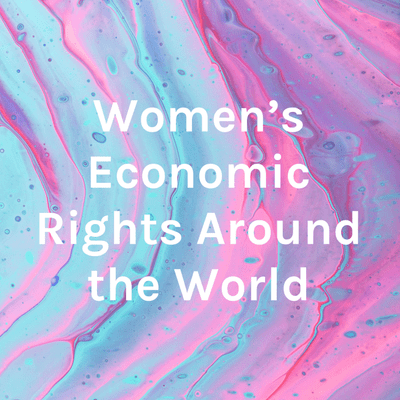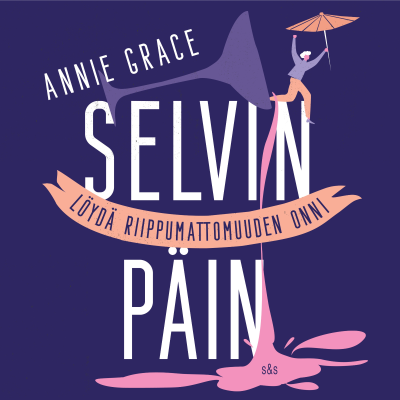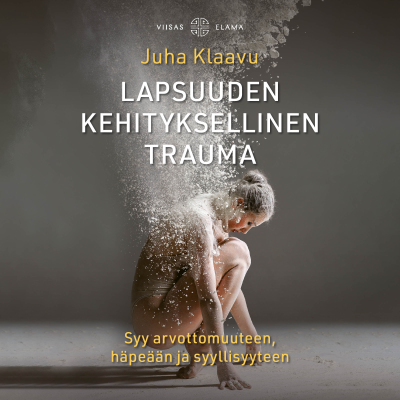
Women's Economic Rights Around the World
englanti
Teknologia & tieteet
Rajoitettu tarjous
2 kuukautta hintaan 1 €
Sitten 7,99 € / kuukausiPeru milloin tahansa.
- Podimon podcastit
- Lataa offline-käyttöön
Lisää Women's Economic Rights Around the World
We discuss the importance of women's economic rights and how it relates to the larger discussion of global human rights.
Kaikki jaksot
6 jaksotAn Inter-relational Approach to Maquila Work and Women's Economic Autonomy in Mexico and the Northern Triangle Part 1
For this episode, I wanted to discuss some of my own research, utilizing an inter-relational approach to interpreting high turnover rates in maquiladora industry, which considers economic, social, and cultural factors that work to keep women from pursuing their economic rights. Creticos, P. A., & Sohnen, E. (2013). Manufacturing in the United States, Mexico, and Central America: Implications for Competitiveness and Migration. The Regional Migration Study Group, 35. Data2X, Open Data Watch, & United Nations Economic Commission for Latin America and the Caribbean. Bridging the Gap: Mapping Gender Data Availability in Latin America and the Caribbean (pp. 1–9). Retrieved from https://data2x.org/wp-content/uploads/2020/10/BridgeTheGap-LatinAmerica-KeyFindingsFINAL.pdf Derechos que penden de un Hilo, Zonas Francas textiles frente a cooperativas de comercio justo. Oxfam Intermón, Abril 2015, p. 4. Domínguez, E., Icaza, R., Quintero, C., López, S., & Stenman, Å. (2010). Women Workers in the Maquiladoras and the Debate on Global Labor Standards. Feminist Economics, 16(4), 185–209. https://doi.org/10.1080/13545701.2010.530603 Equipo de Investigaciones Laborales & Red de Solidaridad de la Maquila. (2016). Las trabajadoras(es) de la industria maquiladora en Centroamérica. Retrieved from https://www.maquilasolidarity.org/sites/default/files/attachment/Trabajadores_de_la_maquila_C.A_2016.pdf Garcia Guerrero, V., Giorguli-Saucedo, S., & Masferrer, C. (n.d.). Emerging Demographic Challenges and Persistent Trends in Mexico and the Northern Triangle of Central America [Text]. Hoover Institution. Retrieved April 16, 2021, from https://www.hoover.org/research/emerging-demographic-challenges-and-persistent-trends-mexico-and-northern-triangle-central Gender Equality Observatory for Latin America and the Caribbean. (2020, October 11). Interrelationship of the autonomies. Gender Equality Observatory for Latin America and the Caribbean. https://oig.cepal.org/en/autonomies/interrelationship-autonomies. Goldín, L. (2012). From despair to resistance: Maya workers in the maquilas of guatemala. Anthropology of Work Review, 33(1), 25-33. https://doi.org/10.1111/j.1548-1417.2012.01074.x Latinobarómetro Corporation. 2018. Latinobarómetro Online Data Analysis 1995 - 2018. Accessed April 28, 2021. https://www.latinobarometro.org/latOnline.jsp Schneider, Mark. L., & Runde, D. F. (2019, May 8). A New Social Contract for the Northern Triangle. Center for Strategic & International Studies. https://www.csis.org/analysis/new-social-contract-northern-triangle World Bank. (2012). A Gender (R)evolution in the Making? Expanding Women’s Economic Opportunities in Central America : A Decade in Review. In World Bank Other Operational Studies (No. 12468; World Bank Other Operational Studies). The World Bank. https://ideas.repec.org/p/wbk/wboper/12468.html
An Inter-relational Approach to Maquila Work and Women's Economic Autonomy in Mexico and the Northern Triangle Part 2
Picking up where I left off in the last episode, I continue to discuss some of my own research, utilizing an inter-relational approach to interpreting high turnover rates in maquiladora industry, which considers economic, social, and cultural factors that work to keep women from pursuing their economic rights. Castillo, Rafael (2015) “Murdered in México State: The Silent Epidemic of Women Killings in México”. Available at: https://news.vice.com/article/murdered-in-mexico-state-the-silent-epidemic-of-women-killings-in-méxico [https://news.vice.com/article/murdered-in-mexico-state-the-silent-epidemic-of-women-killings-in-m%C3%A9xico] Domínguez, E., Icaza, R., Quintero, C., López, S., & Stenman, Å. (2010). Women Workers in the Maquiladoras and the Debate on Global Labor Standards. Feminist Economics, 16(4), 185–209. [https://doi.org/10.1080/13545701.2010.530603]https://doi.org/10.1080/13545701.2010.530603 [https://doi.org/10.1080/13545701.2010.530603] Economic Commission for Latin America and the Caribbean (ECLAC). 2019. Gender Equality Observatory for Latin America and the Caribbean. Indicator: "People without incomes of their own." Accessed April 28, 2021. https://oig.cepal.org/en/indicators/people-without-incomes-their-own [https://oig.cepal.org/en/indicators/people-without-incomes-their-own] Fussell, E. (2000). Making Labor Flexible: The Recomposition of Tijuana’s Maquiladora Female Labor Force. Feminist Economics, 6(3), 59–79. [https://doi.org/10.1080/135457000750020137]https://doi.org/10.1080/135457000750020137 [https://doi.org/10.1080/135457000750020137] Latinobarómetro Corporation. 2018. Latinobarómetro Online Data Analysis 1995 - 2018. Accessed April 28, 2021. https://www.latinobarometro.org/latOnline.jsp [https://www.latinobarometro.org/latOnline.jsp] Maquila Solidarity Network. Workers in crisis in the garment industry in Mexico: a conversation with the Worker Support Centre | Maquila Solidarity Network. (2021, March 1). https://www.maquilasolidarity.org/en/workers-crisis-garment-industry-mexico-conversation-worker-support-centre. Marx, S. (2020). Wage and Gender-Based Violence (pp. 1–8). FEMNET e.V. Retrieved from file:///C:/Users/17025/Downloads/wages_and_GBV_FEMNET_position_paper.pdf Pantaleo, K. (2010). Gendered Violence: An Analysis of the Maquiladora Murders. International Criminal Justice Review, 20(4), 349–365. [https://doi.org/10.1177/1057567710380914]https://doi.org/10.1177/1057567710380914 [https://doi.org/10.1177/1057567710380914] Secretaría de Gobernación (SEGOB) [Secretary of Government], Instituto Nacional de las Mujeres (INMUJERES) [National Institute of Women] and UN Women, La Violencia Feminicida en México, Aproximaciones y Tendencias 1985-2014 [Femicide Violence in México, Approximations and Trends] (April 2016) [hereinafter SEGOB Report], page 10. Taylor, G. (2010). The Abject Bodies of the Maquiladora Female Workers on a Globalized Border. Race, Gender & Class, 17(3/4), 349–363. Weissman, Deborah M. 2005. ‘‘The Political Economy of Violence: Towards an Understanding of Gender-Based Murders of Ciudad Juarez.’’ North Carolina Journal of International Law and Commercial Regulation 30(4): 795–866.
Economic Trends, Flexible Labor, and High Turnover Rates
This episode will go over economic trends in Central America between 1997 and 2006, focusing on the economic achievements and obstacles of women in the region, the recomposition of the Tijuana maquiladora female labor force, and reviewing several arguments about the exploitive or empowering work for women in the maquila sector. Gender Equality Observatory for Latin America and the Caribbean. (2020, October 11). Interrelationship of the autonomies. Gender Equality Observatory for Latin America and the Caribbean. https://oig.cepal.org/en/autonomies/interrelationship-autonomies. Goldín, L. R. (2011). LABOR TURNOVER AMONG MAQUILADORA WORKERS OF HIGHLAND GUATEMALA: Resistance and semiproletarianization in global capitalism.Latin American Research Review, 46(3), 133-156. https://doi.org/10.1353/lar.2011.0043 [https://doi.org/10.1353/lar.2011.0043] Fussell, E. (2000). Making Labor Flexible: The Recomposition of Tijuana’s Maquiladora Female Labor Force. Feminist Economics, 6(3), 59–79. [https://doi.org/10.1080/135457000750020137]https://doi.org/10.1080/135457000750020137 [https://doi.org/10.1080/135457000750020137] Kabeer, Naila. 2004. ‘‘Globalization, Labor Standards, and Women’s Rights: Dilemmas of Collective (In)Action in an Interdependent World.’’ Feminist Economics 10(1): 3–35. “World Bank. 2012. A Gender (R)evolution in the Making? Expanding Women's Economic Opportunities in Central America : A Decade in Review. Washington, DC. © World Bank. https://openknowledge.worldbank.org/handle/10986/12468 [https://openknowledge.worldbank.org/handle/10986/12468]License: CC BY 3.0 IGO.”
Financial Crises, Informal Employment, and Maquiladora Workers
This episode will focus on the Central American region of the world, discussing the effects that the 2008 global financial crisis had on women's workers, how women are increasingly turning to informal employment and the repercussions associated with this, and the benefits and costs of working in the maquiladora industry. Biles, James J. "Informal Work and Livelihoods in Mexico: Getting by Or Getting Ahead?" The Professional Geographer, vol. 60, no. 4, 2008, pp. 541-555. Domínguez, Edmé, et al. "Women Workers in the Maquiladoras and the Debate on Global Labor Standards." Feminist Economics, vol. 16, no. 4, 2010, pp. 185-209. Espino, Alma. "Gender Dimensions of the Global Economic and Financial Crisis in Central America and the Dominican Republic." Feminist Economics, vol. 19, no. 3, 2013, pp. 267-288.
State Socialism, Microcredit, Globalization and Forced Labor
For this episode, we are evaluating East vs West German ideals on women’s economic inclusion after WWII, the use of microcredit in South Africa, and the relation between globalization and women’s economic rights and the occurrence of forced labor. Campa, Pamela, and Michel Serafinelli. "Politico-Economic Regimes and Attitudes: Female Workers Under State Socialism." The Review of Economics and Statistics, vol. 101, no. 2, 2019, pp. 233-248. Kim, Julia C., et al. "Understanding the Impact of a Microfinance-Based Intervention on Women’s Empowerment and the Reduction of Intimate Partner Violence in South Africa." American Journal of Public Health (1971), vol. 97, no. 10, 2007, pp. 1794-1802. Neumayer, Eric, and Indra de Soysa. "Globalisation, Women's Economic Rights and Forced Labour." World Economy, vol. 30, no. 10, 2007, pp. 1510-1535.
Valitse tilauksesi
Rajoitettu tarjous
Premium
Podimon podcastit
Lataa offline-käyttöön
Peru milloin tahansa
2 kuukautta hintaan 1 €
Sitten 7,99 € / kuukausi
Premium
20 tuntia äänikirjoja
Podimon podcastit
Lataa offline-käyttöön
Peru milloin tahansa
30 vrk ilmainen kokeilu
Sitten 9,99 € / kuukausi
Premium
100 tuntia äänikirjoja
Podimon podcastit
Lataa offline-käyttöön
Peru milloin tahansa
30 vrk ilmainen kokeilu
Sitten 19,99 € / kuukausi
2 kuukautta hintaan 1 €. Sitten 7,99 € / kuukausi. Peru milloin tahansa.

































